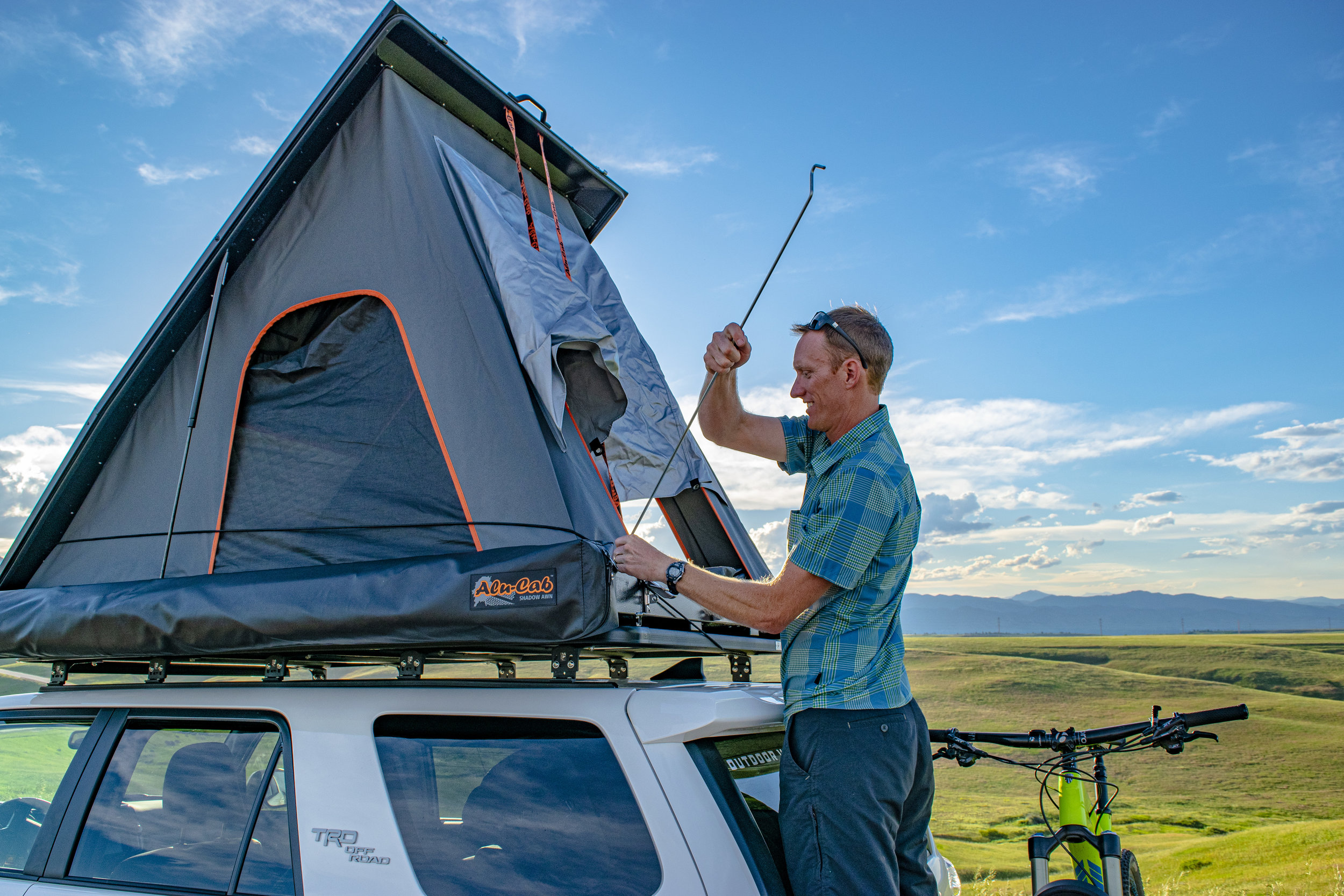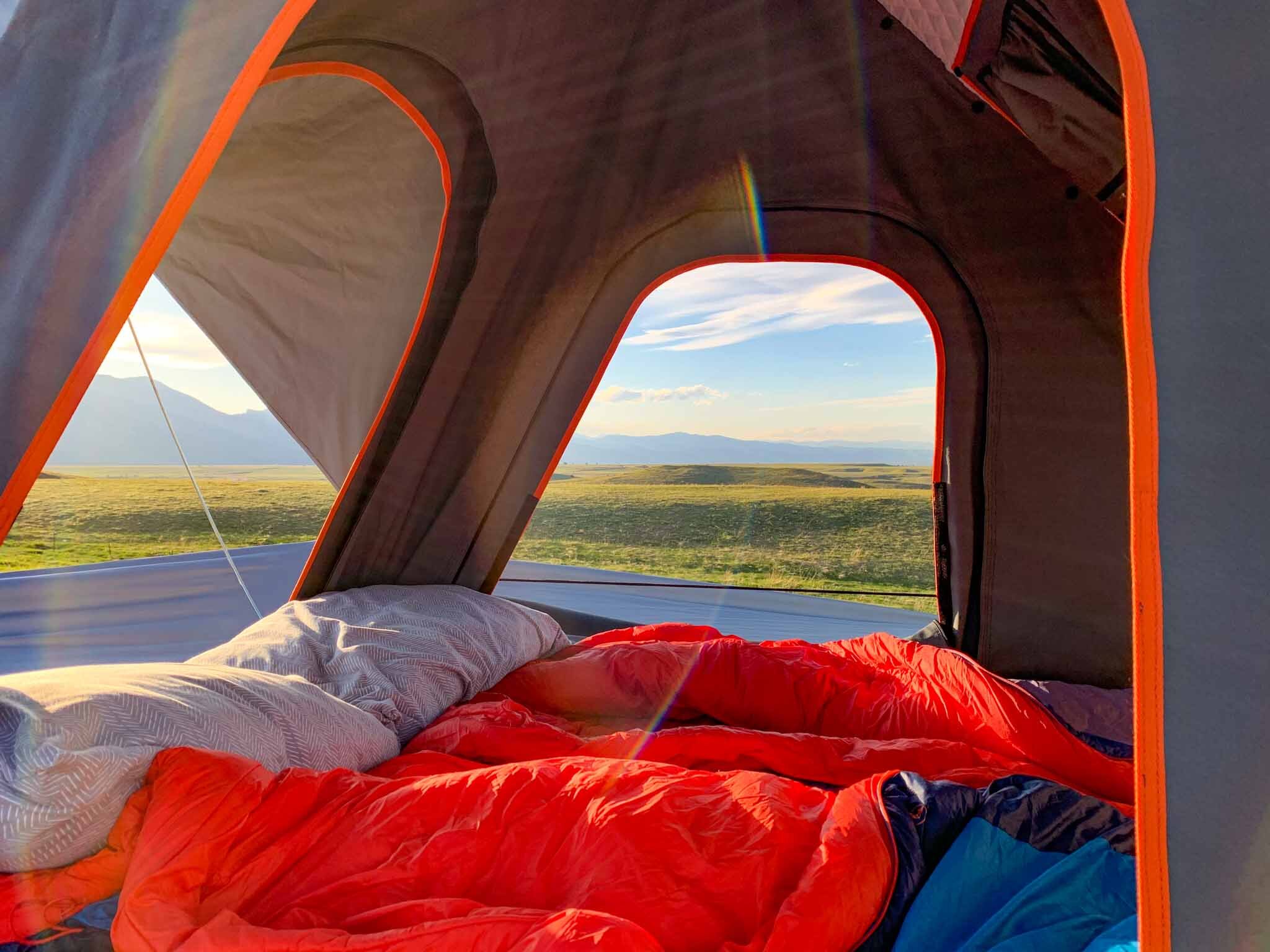Rooftop Tents: How They Will Improve The Way You Camp But Why It’s Better To Rent Than Own
Rooftop Tent Origin and What They Look Like
Have you started to notice giant black boxes on top of vehicles recently? No they aren’t cargo racks, top carriers, or some crazy satellite dish. They are probably rooftop tents (RTT), which are catching on in the US after decades of use in other countries where overlanding is more common. Whether you are going on a rugged expedition or just car camping at a trailhead, having a rooftop tent simplifies camp setup and makes for a better night sleep than sleeping in the back of your hatchback.
There are a lot of flavors of rooftop tents coming on the market and we checked out most of them. We use Alu-Cab and iKamper tents on our vehicles for their ease of use and durability. The Alu-Cab tent is made in South Africa and by far the most durable on the market and also one of the easiest to use. The exterior is made from aluminum sheet metal (most others are fiberglass) and has thick insulation in the walls. Opening it up is as simple as unlocking two latches and giving it enough of a push to let the gas struts open it the rest of the way. Done! The tent is accessed by a ladder that stows inside and hooks below one of three doors. Inside the mattress is the size of a full-size bed making it great for 1-2 people.
The iKamper tent is much larger but also easy to use and rugged. Inside is a king-size mattress and skylight making it a great option for families!
Want to see the set up in action, watch the tutorial video below of the Alu-Cab Rooftop Tent and 270° Awning:
Why Use A Rooftop Tent Over A Traditional Tent
RTTs will elevate your camping experience as they let you have some of the bedding comforts of an RV but can access much more remote areas that need a 4x4 vehicle. In the west we are fortunate to have lots of public land and rooftop tents are a great way to go dispersed car camping, meaning not parking in designated campgrounds.
Setup and takedown in just a few minutes (look like a backcountry expert without trying!)
Comfy 3” thick foam mattress inside that can be fitted with sheets and a blanket (which is really great if you don’t sleep well in a mummy-style sleeping bag)
Best view in camp (and best breeze)
No worrying about setting up tent on rough, uneven, or wet ground
Packing up doesn’t involve dealing with wet rainfly, dirty tent floor or deflating sleeping pads
Can leave sleeping items like sleeping bags and pillows inside when closed
Elevates you off the ground giving a little space from camp critters
Stays cooler and darker than ground tents because of the hard top and thicker materials
Downsides To Rooftop Tents
There are a few major downsides to rooftop tents which you might imagine. Most of the involve cost and times it is not being used for camping.
Cost: Price runs anywhere from around $1,500 to over $4,000 depending on quality and style. The bigger, nicer tents need special racks to support them so that is more cost to the setup.
RTTs add to the overall height of the vehicle, which might prohibit it from going into many garages. Our vehicles need 7.5ft to 8ft of clearance which rules out many houses and parking garages
RTTs are heavy enough that you really don’t want to take them on and off the vehicle frequently. This might become a problem if there are times during the year when you want to put other things on your car roof, such as a ski rack or bike rack. If you do remove it, storing it can be a challenge.
Access requires the use of a ladder. That can be challenging for kids or folks with mobility issues. We have installed some handles to help make it easier but you still have a 6ft climb up or down. Going to the bathroom in the night requires a little more care too.
RTTs don’t have as much room inside as some large ground tents. While we have some of the larger ones on the market you can’t really stand up in them and they are not as conducive to “hanging out” in.
On the road it makes wind noise and decreases fuel economy
Not very fido friendly as most dogs don’t want to be off the ground and getting them out is tricky. Our camp dogs sleep in the vehicle.
Not going to fit!
Renting Provides The Perfect Solution
Rooftop tents are a great way to make your camping trip easier and better, but unless you are out in the backcountry frequently they are not something practical to have on your daily driving car. So we say hop into a fully rigged overlanding vehicle for the times you need it and not have to invest thousands into something you use a handful of times or prevents you from parking in a garage? We think renting one of our off-road vehicles with the tent already on it lets you have the best of both worlds.
Our Rental Options
Full Overland Vehicle Rental
Don’t have your own overland vehicle or want to try one of ours? We provide a turn-key overland vehicle loaded with the rooftop tent, awning, and gear, fridge and more!
Rooftop Tent Rental
Want to just try out a rooftop tent tent? We rent out the iKamper Mini tent and can easily mount it you your vehicle. It is a great way to try before buying.
About Titus Adventure Company
Based out of Denver Colorado, we are your gateway to get you into the Rocky Mountains and beyond. We rent premium 4x4 SUVs as well as campervans rigged for making your trip outdoors easier and better. Our rentals come with unlimited miles, bedding, camping gear and 5-star customer service. Not sure where to go? We can provide customer trip planning to help you find those local hidden gems!








